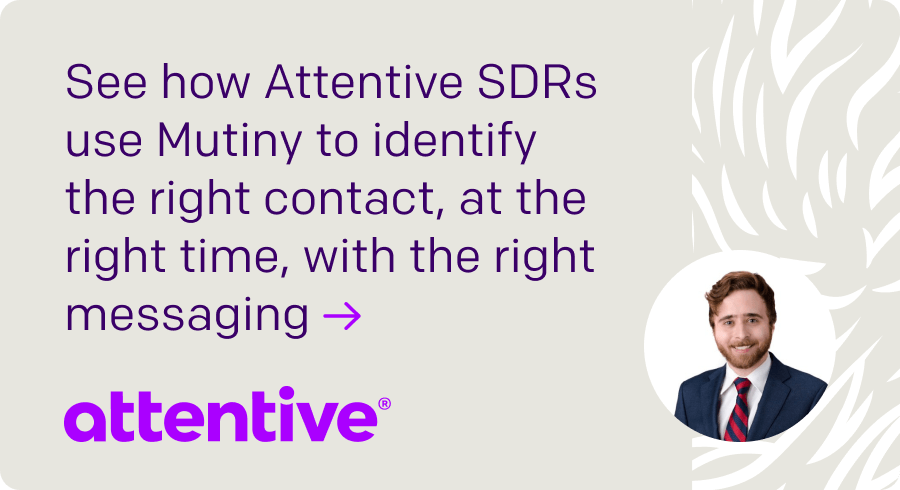- Product
- Content
- Customers
- Company
WHAT YOU'LL LEARN
- How small changes to your pricing page can boost conversion
- Why showing prices upfront can seriously increase friction
- How to use interactive elements to get more demos booked
WHAT YOU'LL NEED
- A website personalization platform that connects to your CRM
- A way to accurately track and measure conversions, ideally with firmographics data
THE PROBLEM
A few months ago, Lukas Lukosevicius had a conversion problem. The company he runs growth at, Contractbook, had decided to switch their ideal customer profile from small businesses to mid-market companies.
In many ways, the switch went well. But conversion took a serious hit.
“We were better at selling to these companies,” Lukas says, “[but] we noticed that we were basically bottlenecked at the top of the funnel.” This gave Lukas a singular focus: Figure out how to increase top-of-funnel conversion rates and get more prospects talking to the sales team.
THE HYPOTHESIS
In years past, “growth at any cost” was the unspoken (or spoken) rule on many teams in Contractbook’s ideal customer profile. In recent times, this hasn’t rung true. Customers have switched to an efficiency mindset, guarding their wallets more carefully than they used to.
Lukas theorized that new messaging, focusing on efficiency & ROI, would help boost top-of-funnel conversions. And, he thought, where better to start than the pricing page? It’s often the final obstacle to customers booking a demo, and Contractbook’s website showcased price tags well into the thousands.
The final hypothesis was two-fold:
Remove prices from the pricing page. By avoiding the elephant in the room entirely, Lukas’ theory went, customers would be more likely to book a demo. Pricing page messaging would focus on key value props, not big numbers.
Showcase tangible ROI on the pricing page. To do this, Lukas wanted to build an interactive ROI calculator. The idea here was that by showing prospective customers how much they’d save, instead of how much they’d pay, they’d convert. Simple, but potentially effective.
Battle plans in place, the team got to testing.
THE SOLUTION
Overhaul the pricing page with a focus on efficiency and ROI
Here’s what Contractbook’s pricing page looked like before the test:
Pretty standard pricing page. Now, here’s what the test variant looked like:
The new pricing page did a few things exceptionally well:
It flipped the traditional pricing page structure on its head. Instead of showing customers how much they’d pay, it showed customers how much they could save with Contractbook.
The interactive ROI calculator gave people something to do on the page. And, if someone submitted a form through the calculator, they’d be immediately presented with a follow-up CTA to book a demo with the Contractbook team.
Use Mutiny and Clearbit to A/B test the pricing page
Using Mutiny and its integration with Clearbit Reveal, Lukas A/B tested the new pricing page. He was able to segment his website traffic based on their company characteristics like headcount size and industry so he could validate the new ICP that Contractbook was targeting.
He monitored the results, and once Mutiny showed statistical significance he rolled the changes out to 100% of the Contractbook audience.
Small tweaks were made throughout this process, with Lukas and the growth team meeting weekly and using the ICE (impact, confidence, ease) framework to decide on new changes.
Use additional data to customize outbound messaging
The interactive ROI calculator turned out to be a goldmine of data for Lukas and the team. Because each form submission in the ROI calculator was set up as a custom event, Lukas could use Clearbit Reveal to discern which companies were using the calculator—and what they were inputting.
These new insights allowed them to custom-tailor outbound sales messaging. A nice bonus.
THE IMPACT
The final lift in conversion was so dramatic that, at first, Lukas thought it was a typo.
These are the numbers:
Increase in SQL conversions for all company sizes: 679%
Increase in SQL conversions for ICP company sizes: 971%
Using Mutiny, Lukas was 100% confident the results were statistically significant. He rolled out the new pricing page format to everyone and watched conversions climb.
Impressive is an understatement. However, Lukas says, there was a 15% dip in conversion from demo-booking to opportunity conversion. Meaning that, while more people booked demos, a slightly lower percentage of them ended up becoming customers. This is understandable. Without upfront pricing, some customers weren’t properly-qualified.
Still, the increase in top-of-funnel conversion dramatically outweighed this dip—making it almost inconsequential.
Now, Lukas wants to apply these learnings to the rest of the site: More interactive elements, lower friction upfront, and custom animations. With such encouraging results from the pricing page, there’s no telling what results he may be able to achieve with the rest of the site.
Next playbook
Learn from Kayla at Attentive how she got a 77% lift by matching her landing page messaging to her ads (without needing to build hundreds of landing pages).




